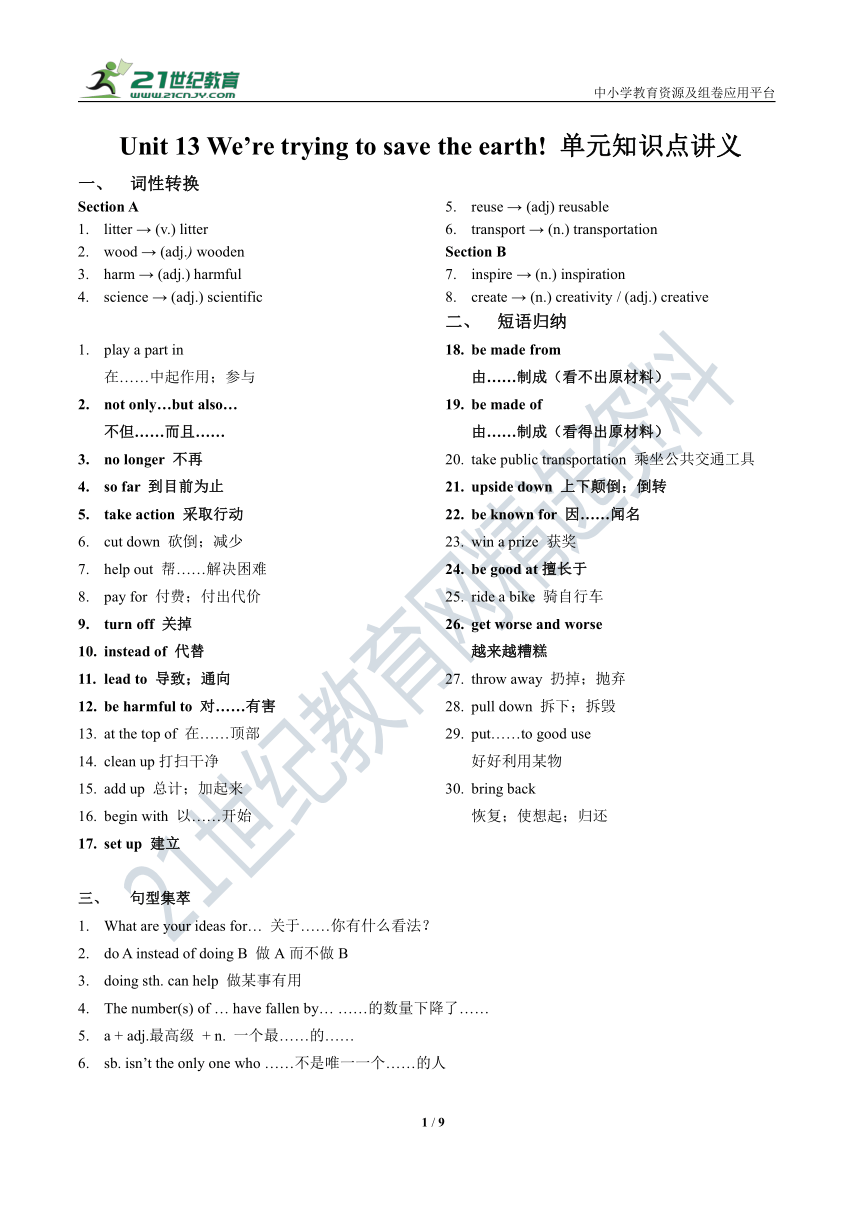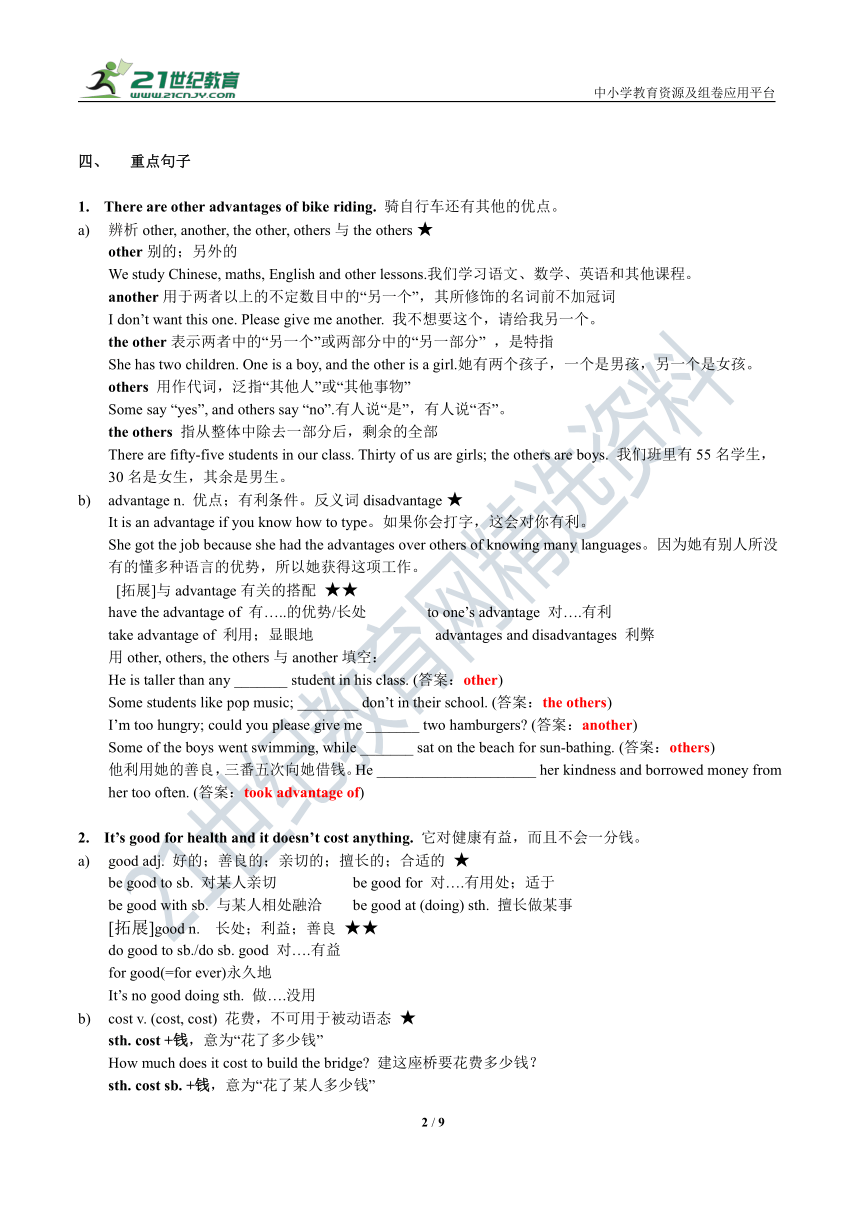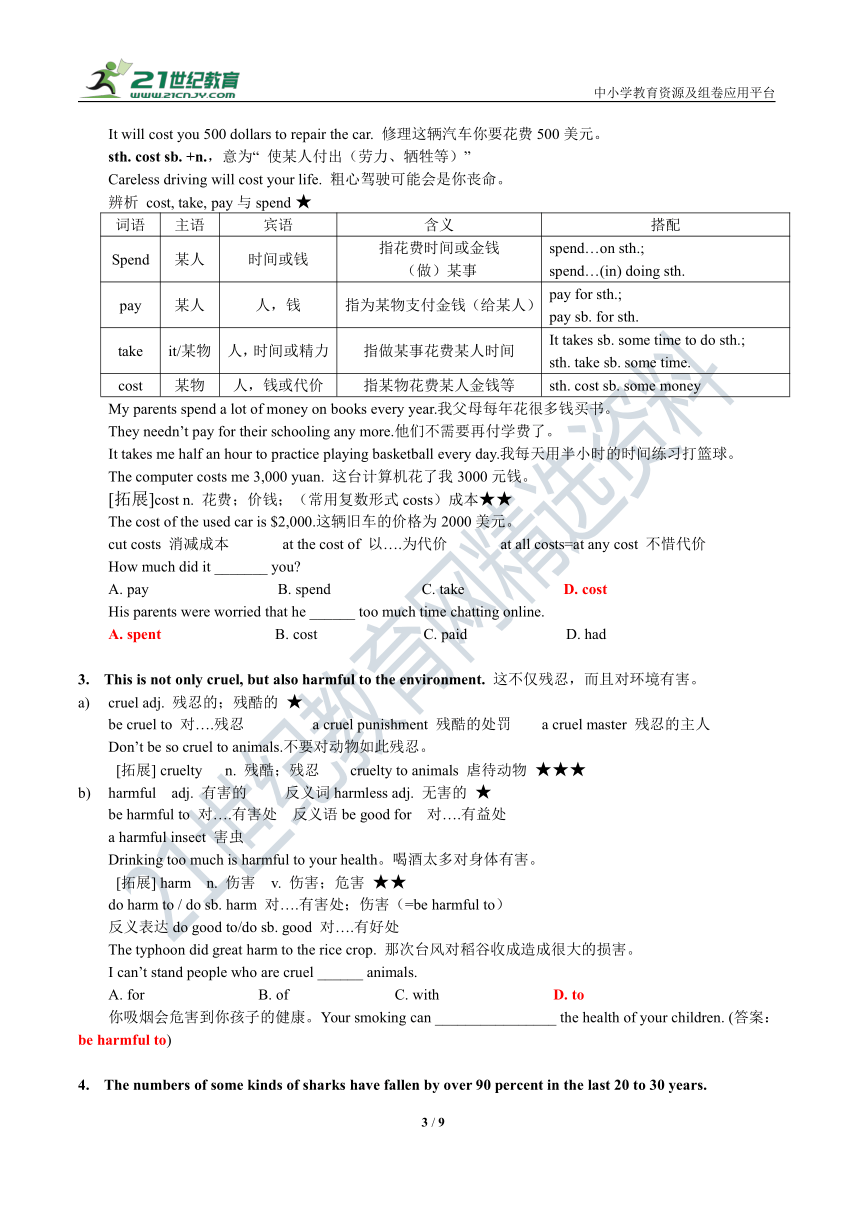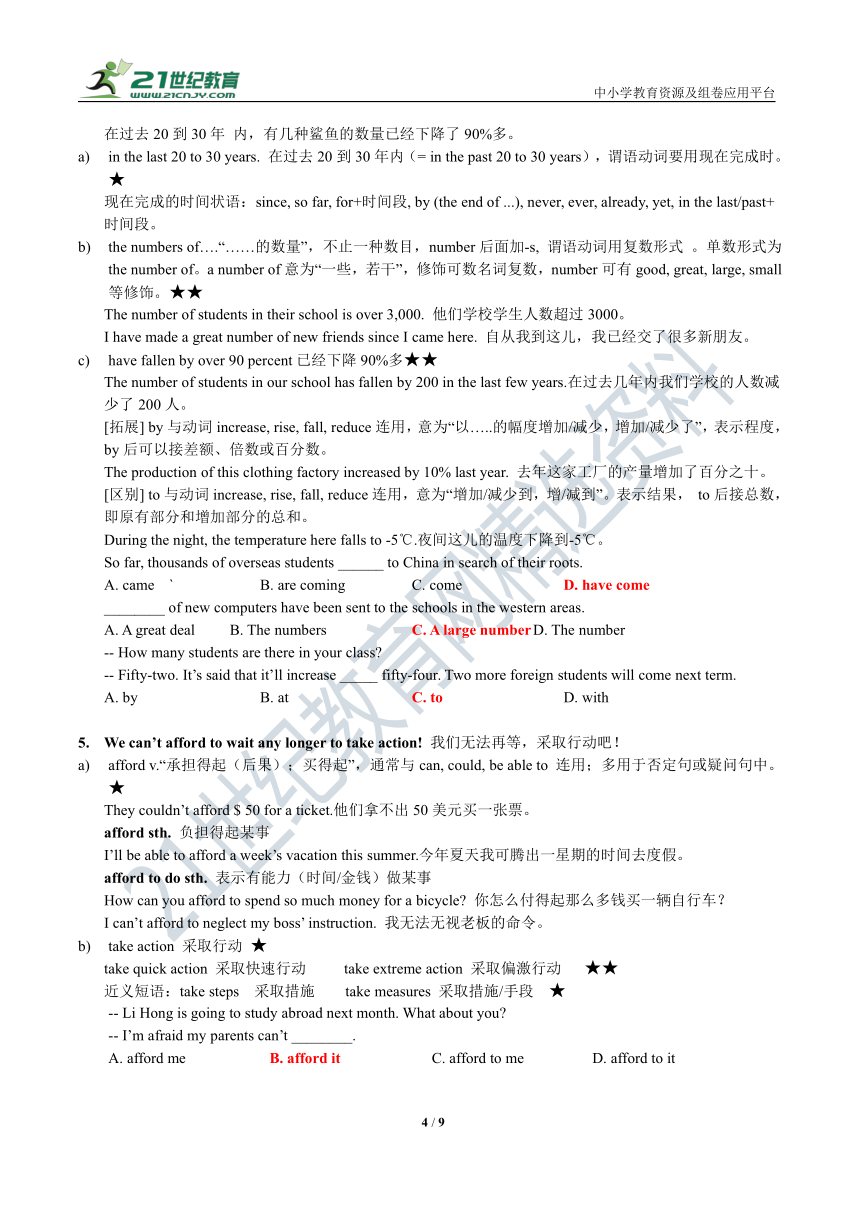Unit 13 We’re trying to save the earth! 单元知识点讲义
文档属性
| 名称 | Unit 13 We’re trying to save the earth! 单元知识点讲义 |

|
|
| 格式 | zip | ||
| 文件大小 | 1.2MB | ||
| 资源类型 | 试卷 | ||
| 版本资源 | 人教新目标(Go for it)版 | ||
| 科目 | 英语 | ||
| 更新时间 | 2020-02-05 00:00:00 | ||
图片预览




文档简介
中小学教育资源及组卷应用平台
Unit 13 We’re trying to save the earth! 单元知识点讲义
词性转换
Section A
litter → (v.) litter
wood → (adj.) wooden
harm → (adj.) harmful
science → (adj.) scientific
reuse → (adj) reusable
transport → (n.) transportation
Section B
inspire → (n.) inspiration
create → (n.) creativity / (adj.) creative
短语归纳
play a part in
在……中起作用;参与
not only…but also…
不但……而且……
no longer 不再
so far 到目前为止
take action 采取行动
cut down 砍倒;减少
help out 帮……解决困难
pay for 付费;付出代价
turn off 关掉
instead of 代替
lead to 导致;通向
be harmful to 对……有害
at the top of 在……顶部
clean up打扫干净
add up 总计;加起来
begin with 以……开始
set up 建立
be made from
由……制成(看不出原材料)
be made of
由……制成(看得出原材料)
take public transportation 乘坐公共交通工具
upside down 上下颠倒;倒转
be known for 因……闻名
win a prize 获奖
be good at擅长于
ride a bike 骑自行车
get worse and worse
越来越糟糕
throw away 扔掉;抛弃
pull down 拆下;拆毁
put……to good use
好好利用某物
bring back
恢复;使想起;归还
句型集萃
What are your ideas for… 关于……你有什么看法?
do A instead of doing B 做A而不做B
doing sth. can help 做某事有用
The number(s) of … have fallen by… ……的数量下降了……
a + adj.最高级 + n. 一个最……的……
sb. isn’t the only one who ……不是唯一一个……的人
重点句子
There are other advantages of bike riding. 骑自行车还有其他的优点。
辨析other, another, the other, others与the others ★
other别的;另外的
We study Chinese, maths, English and other lessons.我们学习语文、数学、英语和其他课程。
another用于两者以上的不定数目中的“另一个”,其所修饰的名词前不加冠词
I don’t want this one. Please give me another. 我不想要这个,请给我另一个。
the other表示两者中的“另一个”或两部分中的“另一部分” ,是特指
She has two children. One is a boy, and the other is a girl.她有两个孩子,一个是男孩,另一个是女孩。
others 用作代词,泛指“其他人”或“其他事物”
Some say “yes”, and others say “no”.有人说“是”,有人说“否”。
the others 指从整体中除去一部分后,剩余的全部
There are fifty-five students in our class. Thirty of us are girls; the others are boys. 我们班里有55名学生,30名是女生,其余是男生。
advantage n. 优点;有利条件。反义词disadvantage ★
It is an advantage if you know how to type。如果你会打字,这会对你有利。
She got the job because she had the advantages over others of knowing many languages。因为她有别人所没有的懂多种语言的优势,所以她获得这项工作。
[拓展]与advantage有关的搭配 ★★
have the advantage of 有…..的优势/长处 to one’s advantage 对….有利
take advantage of 利用;显眼地 advantages and disadvantages 利弊
用other, others, the others与another填空:
He is taller than any _______ student in his class. (答案:other)
Some students like pop music; ________ don’t in their school. (答案:the others)
I’m too hungry; could you please give me _______ two hamburgers? (答案:another)
Some of the boys went swimming, while _______ sat on the beach for sun-bathing. (答案:others)
他利用她的善良,三番五次向她借钱。He _____________________ her kindness and borrowed money from her too often. (答案:took advantage of)
It’s good for health and it doesn’t cost anything. 它对健康有益,而且不会一分钱。
good adj. 好的;善良的;亲切的;擅长的;合适的 ★
be good to sb. 对某人亲切 be good for 对….有用处;适于
be good with sb. 与某人相处融洽 be good at (doing) sth. 擅长做某事
[拓展]good n. 长处;利益;善良 ★★
do good to sb./do sb. good 对….有益
for good(=for ever)永久地
It’s no good doing sth. 做….没用
cost v. (cost, cost) 花费,不可用于被动语态 ★
sth. cost +钱,意为“花了多少钱”
How much does it cost to build the bridge? 建这座桥要花费多少钱?
sth. cost sb. +钱,意为“花了某人多少钱”
It will cost you 500 dollars to repair the car. 修理这辆汽车你要花费500美元。
sth. cost sb. +n.,意为“ 使某人付出(劳力、牺牲等)”
Careless driving will cost your life. 粗心驾驶可能会是你丧命。
辨析 cost, take, pay与spend ★
词语 主语 宾语 含义 搭配
Spend 某人 时间或钱 指花费时间或金钱 (做)某事 spend…on sth.; spend…(in) doing sth.
pay 某人 人,钱 指为某物支付金钱(给某人) pay for sth.; pay sb. for sth.
take it/某物 人,时间或精力 指做某事花费某人时间 It takes sb. some time to do sth.; sth. take sb. some time.
cost 某物 人,钱或代价 指某物花费某人金钱等 sth. cost sb. some money
My parents spend a lot of money on books every year.我父母每年花很多钱买书。
They needn’t pay for their schooling any more.他们不需要再付学费了。
It takes me half an hour to practice playing basketball every day.我每天用半小时的时间练习打篮球。
The computer costs me 3,000 yuan. 这台计算机花了我3000元钱。
[拓展]cost n. 花费;价钱;(常用复数形式costs)成本★★
The cost of the used car is $2,000.这辆旧车的价格为2000美元。
cut costs 消减成本 at the cost of 以….为代价 at all costs=at any cost 不惜代价
How much did it _______ you?
A. pay B. spend C. take D. cost
His parents were worried that he ______ too much time chatting online.
A. spent B. cost C. paid D. had
This is not only cruel, but also harmful to the environment. 这不仅残忍,而且对环境有害。
cruel adj. 残忍的;残酷的 ★
be cruel to 对….残忍 a cruel punishment 残酷的处罚 a cruel master 残忍的主人
Don’t be so cruel to animals.不要对动物如此残忍。
[拓展] cruelty n. 残酷;残忍 cruelty to animals 虐待动物 ★★★
harmful adj. 有害的 反义词harmless adj. 无害的 ★
be harmful to 对….有害处 反义语be good for 对….有益处
a harmful insect 害虫
Drinking too much is harmful to your health。喝酒太多对身体有害。
[拓展] harm n. 伤害 v. 伤害;危害 ★★
do harm to / do sb. harm 对….有害处;伤害(=be harmful to)
反义表达do good to/do sb. good 对….有好处
The typhoon did great harm to the rice crop. 那次台风对稻谷收成造成很大的损害。
I can’t stand people who are cruel ______ animals.
A. for B. of C. with D. to
你吸烟会危害到你孩子的健康。Your smoking can ________________ the health of your children. (答案:be harmful to)
The numbers of some kinds of sharks have fallen by over 90 percent in the last 20 to 30 years.
在过去20到30年 内,有几种鲨鱼的数量已经下降了90%多。
in the last 20 to 30 years. 在过去20到30年内(= in the past 20 to 30 years),谓语动词要用现在完成时。★
现在完成的时间状语:since, so far, for+时间段, by (the end of ...), never, ever, already, yet, in the last/past+时间段。
the numbers of….“……的数量”,不止一种数目,number后面加-s, 谓语动词用复数形式 。单数形式为the number of。a number of意为“一些,若干”,修饰可数名词复数,number可有good, great, large, small等修饰。★★
The number of students in their school is over 3,000. 他们学校学生人数超过3000。
I have made a great number of new friends since I came here. 自从我到这儿,我已经交了很多新朋友。
have fallen by over 90 percent已经下降90%多★★
The number of students in our school has fallen by 200 in the last few years.在过去几年内我们学校的人数减少了200人。
[拓展] by与动词increase, rise, fall, reduce连用,意为“以…..的幅度增加/减少,增加/减少了”,表示程度,by后可以接差额、倍数或百分数。
The production of this clothing factory increased by 10% last year. 去年这家工厂的产量增加了百分之十。
[区别] to与动词increase, rise, fall, reduce连用,意为“增加/减少到,增/减到”。表示结果, to后接总数,即原有部分和增加部分的总和。
During the night, the temperature here falls to -5℃.夜间这儿的温度下降到-5℃。
So far, thousands of overseas students ______ to China in search of their roots.
A. came ` B. are coming C. come D. have come
________ of new computers have been sent to the schools in the western areas.
A. A great deal B. The numbers C. A large number D. The number
-- How many students are there in your class?
-- Fifty-two. It’s said that it’ll increase _____ fifty-four. Two more foreign students will come next term.
A. by B. at C. to D. with
We can’t afford to wait any longer to take action! 我们无法再等,采取行动吧!
afford v.“承担得起(后果);买得起”,通常与can, could, be able to 连用;多用于否定句或疑问句中。★
They couldn’t afford $ 50 for a ticket.他们拿不出50美元买一张票。
afford sth. 负担得起某事
I’ll be able to afford a week’s vacation this summer.今年夏天我可腾出一星期的时间去度假。
afford to do sth. 表示有能力(时间/金钱)做某事
How can you afford to spend so much money for a bicycle? 你怎么付得起那么多钱买一辆自行车?
I can’t afford to neglect my boss’ instruction. 我无法无视老板的命令。
take action 采取行动 ★
take quick action 采取快速行动 take extreme action 采取偏激行动 ★★
近义短语:take steps 采取措施 take measures 采取措施/手段 ★
-- Li Hong is going to study abroad next month. What about you?
-- I’m afraid my parents can’t ________.
A. afford me B. afford it C. afford to me D. afford to it
Recycling paper is really easy. 循环用纸真的很容易。
recycling paper 意为“循环用纸”,动名词在句子中作主语,看作单数,谓语动词用单数。★
Walking on the outer space isn’t to easy for the astronauts. 在外太空行走对宇航员来说真不容易。
Taking exercise every day is necessary. 每天锻炼很有必要。
recycle v. 回收利用;再利用 ★
It’s a good habit to recycle water.循环用水是个好习惯。
[拓展] recyclable adj.可循环利用的 ★★
Do you often throw away things you don’t need anymore? 你经常把你不再需要的东西扔掉吗?
句子分析:这是一个含定语从句的复合句。you don’t need anymore为定语从句,省略了在定语从句中作宾语的关系代词that/which,整个定语从句修饰前面的物things。★
I don’t love movies which/that are scary.我不喜欢恐怖电影。
I’d like to thank all the people who have helped me. 我想感激所有帮助过我的人。
throw away 扔掉;抛弃 ★
Don’t throw away those old clothes. You can donate them to people in need. 别把那些旧衣服扔掉,你可以把它们捐给需要的人。
[拓展] 与throw相关的短语
throw…. at…. 向…..扔….. throw back 扔回 throw up 呕吐
[拓展] 与away相关的动词短语
go away 离开 give away 赠送 keep away from 远离 put away 收拾起来
get away from 逃离 run away 逃走 take away 带走 die away 逐渐消失
The mountain village _____ you visited ten years ago has developed into a big town.
A. / B. which C. that D. All above
Please _______ those old magazines _______.
A. throw; at B. throw; up C. throw; away D. throw; off
Have you ever thought about how these things can actually be put to good use? 你曾经思考过怎样能真正地好好利用这些东西吗?
句子分析:这是一个含有宾语从句的复合句,how引导的宾语从句作介词about的宾语,宾语从句的谓语是含情态动词can的被动语态。★★
Could you please tell me how the problem can be solved? 你能告诉我这个问题该怎么样解决吗?
put…to good use 好好利用 ★
The boy puts his spare time to good use.这个男孩很好地利用他的空闲时间。
[拓展] use作名词的相关短语
make use of 利用 in use 正在用;通用 come into use 开始被使用
out of use 不再使用 了 bring….into use 开始使用
It’s no use doing sth./to do sth. 做….是徒然的
[拓展] use 作动词的相关短语
use up 用光 used to 过去常常 get/be used to doing 习惯于做…..
be used to do 被用于做 be used as 把….当作….使用 be used for doing 被用来做…..
Huiping loves to read and she _____ this love _____ by working in the after-school care center at her local elementary school.
A. come; into use B. put; to good use C. put; into action D. put; to an end
The windows and doors come from old buildings around her town that were pulled down. 窗户和门来自城镇周边被拆掉的旧建筑物。
pull…..down 拆下;摧毁 ★
The tall building was pulled down by the terrorists. 那幢大楼被恐怖分子摧毁了。
The old hospital has been pulled down. A new one is being built.那座旧医院已经拆了,一所新的医院正在修建中。
[拓展]与pull相关的短语 ★★
pull in (车)进站;(船)靠岸 pull out 离开;(车)出站 pull on 穿、戴
pull off 扯下;脱下 pull over 把(车)停靠早路边 pull up (使)停下
pull through (使)渡过难关 pull out of 从…..中推出 pull together 齐心协力,通力合作
The house is really old and dangerous.
It should be ______.
A. pull down B. pull up C. pulled down D. pulled up
She opened a small shop where she sells her bags ….. 她开了一家小店来卖她的包……
where为关系副词,引导定语从句,修饰先行词 a small shop, 并在定语从句中作地点状语。★★
He’s already visited the place where his ancestors lived.他已经参观了他的祖辈生活过的地方。
=He’s already visited the place in which his ancestors lived.
注意:先行词为地点名词时,也可用which/that 引导定语从句,但在从句中作主语或宾语。
This is the small shop which/that she opened last month. 这就是她上个月开的小店。
[拓展] 引导定语从句的关系副词还有when和why,在定语从句中作状语。★★★
April Fool’s Day is a day when people play tricks on each other.愚人节是人们相互捉弄的一天。
That’s the reason why he was late.那就是他迟到的原因。
It’s helpful to put children in a situation _______ they can see themselves differently.
A. when B. where C. which D. that
The more popular works can even be seen in art shops around the city. 更受欢迎的工艺品甚至可以在全市艺术品商店内看到。
work [c] n. (书画、音乐)作品,著作 ★
I like O.Henry’s works.我喜欢欧.亨利的作品。
works 也可作“工厂”讲。a gas works 煤气厂
Not only can the art bring happiness to others, but it also shows that even cold, hard iron can be brought back to life with a little creativity. 这种艺术不但能给他人带来快乐,而且表明,只要一点创意甚至连冷硬的钢铁也能焕发生机。
句子分析:这是个倒装句,含有否定意义的副词not位于句首,句子要部分倒装,be动词、助动词或情态动词提前。★★
bring back 恢复;使想起;归还 ★
Bring back the book from Paul. 从保罗那儿带那本书回来。
Seeing you brought back many good memories.看到你使我想起许多美好的回忆。
[拓展]与back相关的短语:
come back 回来 look back(on) 回顾 take back 取回;归还 talk back 顶嘴
think back 想出来 pay back 偿还 step back 后退 turn back 折回;把….赶回
五、语法归纳:现在进行时,现在完成时,被动语态,情态动词
现在进行时的用法:
表示此时此刻正在进行的动作
I am reading English now. 我现在正在读英语。
表示现阶段正在进行的动作或持续的状态
They are studying hard this term. 他们这学期一直很努力。
go, leave, arrive, start等动词用现在进行时表示将来。
I am going to Beijing this Sunday. 本周日我打算去北京。
当时间状语为now, these days等或当句子中含有look, listen, can you see, can’t you see之类的暗示词时,要使用现在进行时。
【北京】Look! Some children ______ in the river.
A. swim B.swam C. have swum D. are swimming
【襄阳】 --It's time for bed. Where is your sister, Victor?
-- (她在看电视) in the living room. (watch) (答案:She is watching TV)
现在完成时的用法:
表示过去发生的或已经完成的某一动作对现在造成的影响或结果。
I have already watched the TV play. 我已经看过这部电视剧了。
表示动作或状态过去已经开始,持续到现在,也许还要持续下去,常和for+时间段,since+时间点连用,表示持续的动作或状态,多为延续性动词。
We have lived here since 2000. 自从2000年我们一直住在这里。
现在完成时的标志词有already, yet, just, ever, never, before, since, for等。
【襄阳】 – When will you hand in your book report?
-- Sorry, I’m not sure. I _______ writing it yet.
A. didn’t finish B. don’t finish C. hadn’t finished D. haven’t finished
【襄阳】 ---Why won't you go to the movie with me, Gina?
---Because I _______ it twice.
A. see B. have seen C. saw D. will see
【河南省】33. —Excuse me, where is Mr. Brown's office?
—Sorry, I don't know. I_____ here for only a few days.
A. work B. worked C. have worked D. will work
【四川省乐山】Tony is very nice. He is the most enjoyable person I _________.
A. meet ever B. have ever met C. had ever met
【2017广东湛江】—Hello! Could I speak to Lily?
—Sorry, she is not in. She ________Shanghai.
A. have been to B. have gone to C. has been to D. has gone to
【襄阳】 ---Your schoolbag is very nice. Is it new?
---No. I ________________________________ (自从我两年前入校时就买了). (since) (答案:have had/kept it since I entered/came/went into the school two years ago)
被动语态主要用于下列几种情况:
不知道动作的执行者是谁。
This watch is made in China. 这块手表是中国制造的。
没有必要指出动作的执行者是谁。
More trees must be planted every year. 每年都应该种更多的树。
需要强调或突出动作的承受者时。
Chinese is spoken by more and more people in the world.
句子的主语是物。
Many houses were washed away by the flood.
【襄阳】---Don’t you see the sign “No Parking!” on the right?
---Sorry, I didn’t. But now I know parking______ here.
A. wasn’t allowed B. isn’t allowed C. won’t allow D. doesn’t allow
【襄阳】. --What a dean and bright classroom, isn’t it?
--Yes,it’s always clean and bright because it _________every day.
A. cleans B. cleaned C. is cleaned D. was cleaned
【襄阳】--– Do you have good service in your old people’s home?
---- Yes. The old people _______________________________________________ (在这儿比在家里照料得好得多) (look) (答案:are looked after much better here than at home)
77 / 77
同课章节目录
- Unit 1 How can we become good learners.
- Section A
- Section B
- Unit 2 I think that mooncakes are delicious!
- Section A
- Section B
- Unit 3 Could you please tell me where the restroom
- Section A
- Section B
- Unit 4 I used to be afraid of the dark.
- Section A
- Section B
- Unit 5 What are the shirts made of?
- Section A
- Section B
- Review of Units 1-5
- Unit 6 When was it invented?
- Section A
- Section B
- Unit 7 Teenagers should be allowed to choose their
- Section A
- Section B
- Unit 8 It must belong to Carla.
- Section A
- Section B
- Unit 9 I like music that I can dance to.
- Section A
- Section B
- Unit 10 You're supposed to shake hands.
- Section A
- Section B
- Review of Units 6-10
- Unit 11 Sad movies make me cry.
- Section A
- Section B
- Unit 12 Life is full of the unexpected
- Section A
- Section B
- Unit 13 We're trying to save the earth!
- Section A
- Section B
- Unit 14 I remember meeting all of you in Grade 7.
- Section A
- Section B
- Review of Units 11-14
